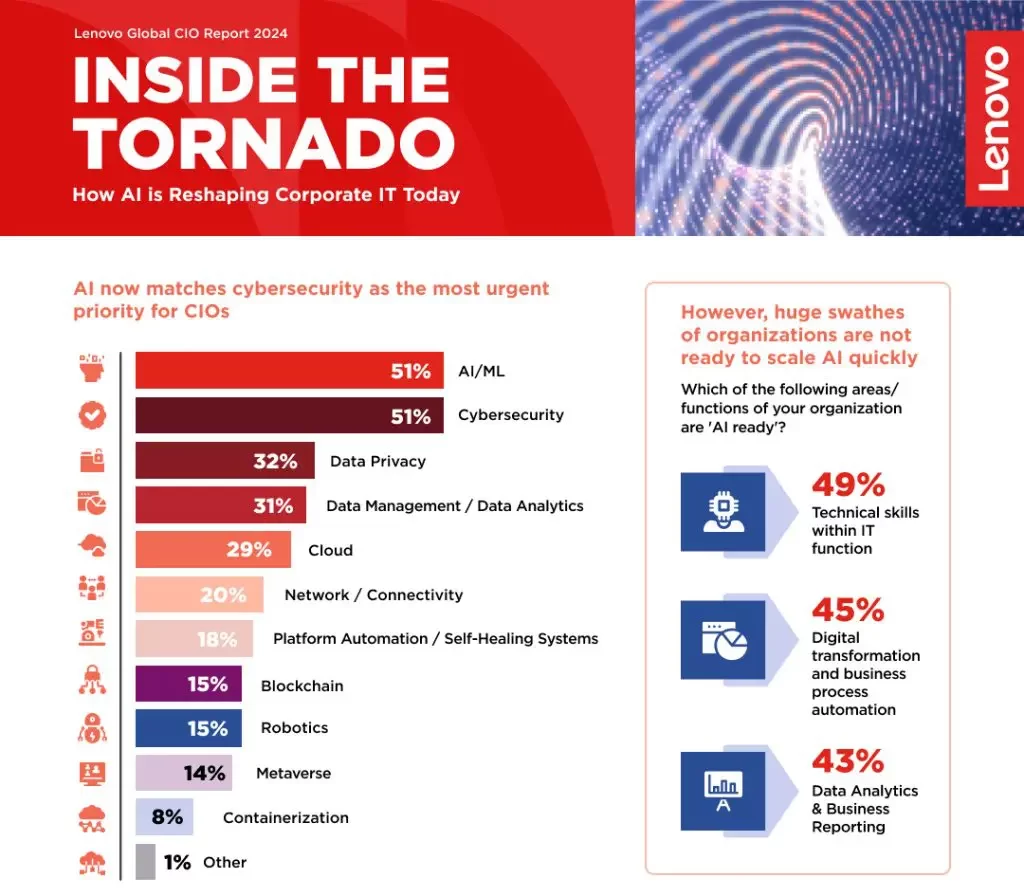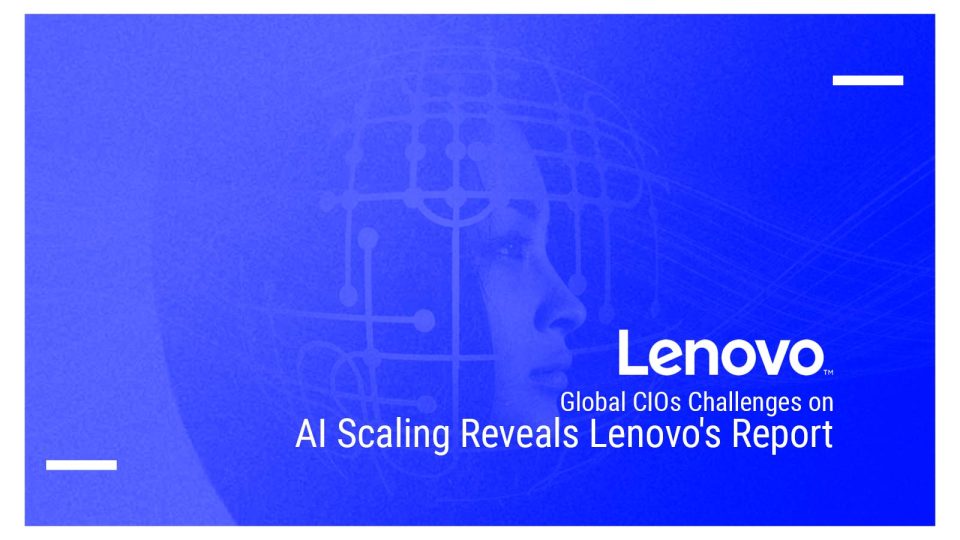Lenovo’s third annual global CIO report unveils AI as the top priority for CIOs. Titled “Inside the Tornado: How AI is Reshaping Corporate IT Today,” the report highlights the urgent need for CIOs to adopt and scale AI. However, their ambitions face threats from speed, security, and lagging organizational readiness.
In a significant shift from previous years, CIOs are prioritizing core IT functions over non-traditional responsibilities. Over half (51%) consider AI/ML an urgent priority, second only to cybersecurity. This urgency stems from the pressure to drive business impact, with 84% of CIOs now evaluated based on business outcome metrics.
The Lenovo Global CIO Report 2024 offers an in-depth analysis of how artificial intelligence (AI) is reshaping the IT landscape, as noted through a comprehensive survey of 750 IT leaders across 10 global markets. This detailed examination not only highlights the current utilization of AI but also discusses the critical areas of security, human capital, and strategic implementation.
Also Read: Top IT, Cloud, Cybersecurity News Updates: Weekly Highlight
Challenges and Optimism: CIOs Need to Deal with AI Creation Challenges and Risk
CIOs are saying that AI is an advantage, with 80 percent of CIOs regarding AI breakthroughs sharing that it will have a great effect on their business. The major barriers identified are delays in the adoption process and security concerns that a large number cited. One of the main roadblocks of IT to performing at its newfound AI excellence is the fact that a huge part of their organizations are not AI-ready, which hampers the rapid scale-out of AI initiatives. To be more specific, they address issues regarding new product pipeline (78%), corporate social responsibility (CSH) and ethical practice (76%), supply chain (74%) as well as IT technical skills (51%).
The human capital factor for AI will always remain unresolved. I still share the proverbs of many CPOs who evaluate the outcomes of AI for their organizations. In terms of technology investment, particularly those in the IT area, 61 percent of the respondents replied that it is either easy or very difficult for them to show ROI from technology investments. 96% have already decided that they will either start investing or increase their investment in AI over the next year and 42% of them acknowledge that profit realized by AI investments may take 2 to 3 years.
 Key Highlights from Lenovo’s CIO Report
Key Highlights from Lenovo’s CIO Report
AI and Corporate IT: A Top Priority
- Urgency and Readiness: AI is now as urgent for Chief Information Officers as cybersecurity; however, there is much less readiness—just 39% of surveyed CIOs feel their security infrastructure is AI-ready, and only 24% feel the same way about their corporate policies regarding operational and ethical use of AI.
- Strategic Focus and ROI Challenges: CIOs are under tremendous pressure to scale AI solutions and show a return on investment. IT is increasingly judged by business outcomes, and this is where AI promises a significant difference, but it takes time to materialize, given the organizational, operational, and security issues involved with AI deployment. Yet, 42% of CIOs don’t envision a return on investment from AI investments within the next two years or more, showing that such efforts are necessarily long-term.
Enhancing IT with AI: Benefits and Barriers
- Productivity and Competitiveness: AI’s impact on productivity is substantial, with gains noted in streamlining tasks, enhancing employee experiences, and improving management information. The technology also boosts competitiveness through improved customer experiences and product line enhancements. However, organizations face significant barriers, including the need for speed in AI implementation, data quality issues, and talent shortages.
- Sustainability Considerations: Sustainability remains a critical component of IT strategy, with 78% of CIOs optimistic that AI can facilitate their sustainability goals. This contrasts with 22% who are concerned about AI’s environmental impact. The role of AI in advancing sustainability within corporate IT illustrates the dual nature of technological advancement—offering solutions while presenting new challenges.
Strategic AI Integration
Aware of the change-making ability of AI, the Solution and Service Group of Lenovo works through the AI Services Practice which is responsible for addressing the AI-readiness of the businesses and developing their IT strategies in accordance with organizational objectives. This support gives businesses the edge and ability to efficiently integrate AI in the intersection of challenges and to gradually increase competitive advantages.
Also Read: CIO Influence Interview with Janet Ravin, VP of Marketing at Rimini Street
Future Outlook
The AI journey of an enterprise will always be in a state of flux and so as its relevance. In the meantime, business firms adapt AI to its fullest potential as an integral component of security, human capital, and a structure for its alignment The road forward contains captivating new opportunities and various obstacles that require a symmetrical approach to technology development focused on both innovation and traditional IT functions.
In a nutshell, the Lenovo Global CIO Report 2024 offers a priceless map to IT experts plotting the road to AI strategic integration success. With the help of readiness, identification of obstacles, and use of outside expertise, companies can manage many difficulties related to the merger.
FAQs
1. What does Lenovo’s third annual global CIO report reveal about the current priorities of CIOs?
The report reveals that AI has emerged as the top priority for CIOs globally, indicating a significant shift in focus towards core IT functions over non-traditional responsibilities.
2. Why is AI adoption urgent for CIOs, and what are the primary challenges they face?
CIOs perceive AI adoption as urgent due to its potential to drive business impact. However, they encounter challenges such as speed, security concerns, and organizational readiness, hindering the scaling of AI initiatives.
3. What are the key findings regarding AI’s impact on corporate IT and the challenges CIOs encounter?
The report highlights AI’s substantial impact on productivity, competitiveness, and sustainability goals. However, CIOs face barriers such as the need for faster implementation, data quality issues, and talent shortages.
4. How does Lenovo’s AI Services Practice support businesses in integrating AI into their IT strategies?
Lenovo’s Solution and Service Group, through its AI Services Practice, assists businesses in assessing AI readiness and developing IT strategies aligned with organizational objectives. This support enables businesses to efficiently integrate AI and gain competitive advantages.
5. What can businesses expect from the future of AI integration in corporate IT, according to the report?
The report suggests that the AI journey for enterprises will remain dynamic, with opportunities for innovation and challenges requiring a balanced approach to technology development. By addressing readiness, identifying obstacles, and leveraging external expertise, businesses can navigate the complexities of AI integration successfully.
[To share your insights with us as part of editorial or sponsored content, please write to sghosh@martechseries.com]


